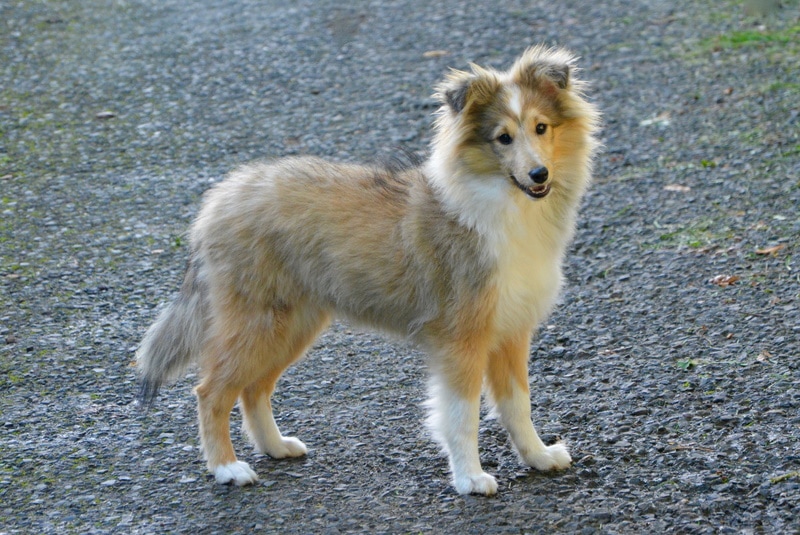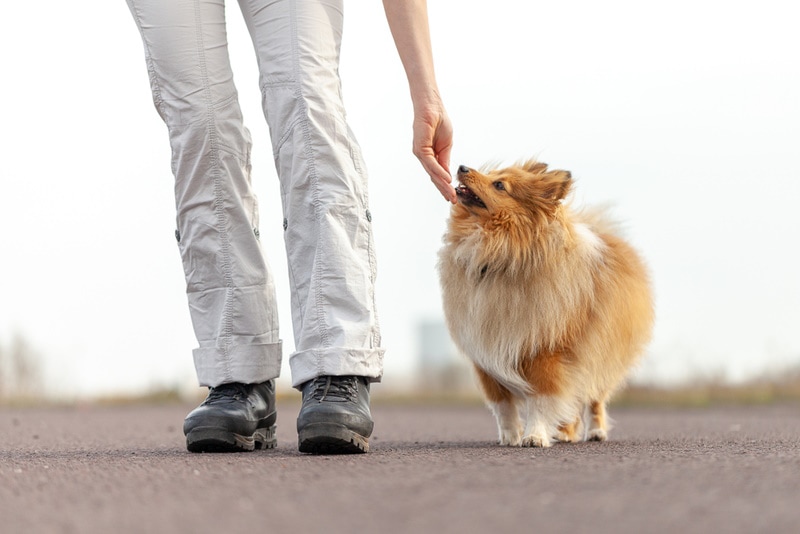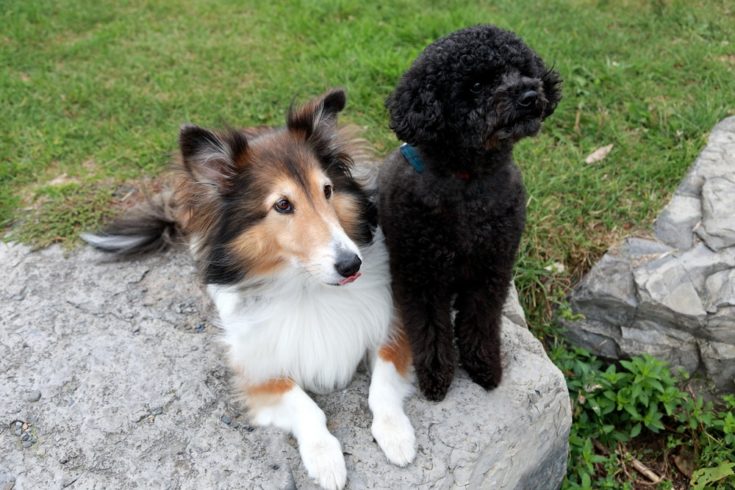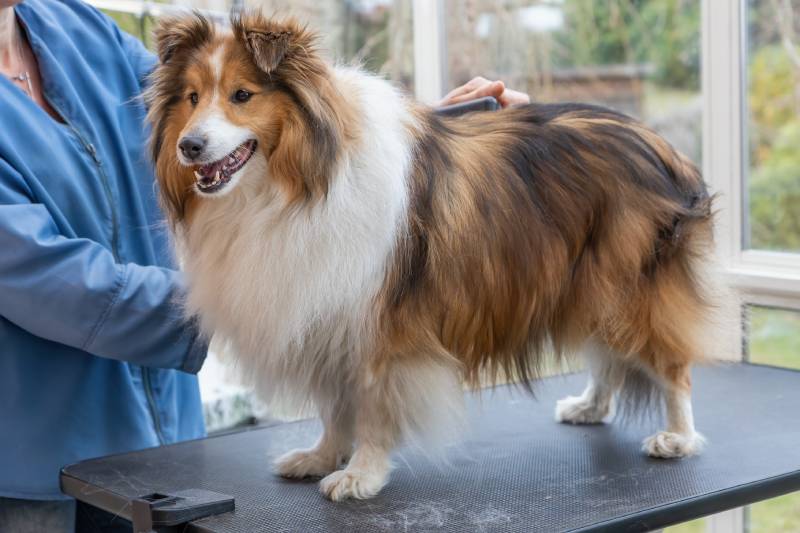15 Sheltie Pros and Cons You Need to Know
Updated on

Click to Skip Ahead
The Shetland Sheepdog is well-known for being a smaller version of the Collie. Shelties are beautiful dogs that make loving companions and wonderful family pets.
Having a Sheltie for a pet has many benefits, and almost every Sheltie owner will agree with them! But there are a few drawbacks to owning this little dog too.
If you’ve been debating bringing home a Sheltie but want to know exactly what you’re getting into, you’ve come to the right place. Here, we cover the pros and cons of this breed so you can decide if this is the right pup for you!
The 8 Pros of Owning a Sheltie
1. Loving Family Dogs
Shelties are known to be loving and loyal dogs that form intensely strong bonds with their owners. They get along famously with children and are playful and gentle.
While Shelties might form a stronger bond with the family member who takes care of them the most (walking, training, feeding, etc.), they love everyone in the family, including the children.

2. Easy to Train
Shelties are intelligent dogs, and they were bred to be herding dogs, so their temperament tends toward a strong loyalty to their owner, and they are quite eager to please.
When you combine these qualities, you end up with a dog that can be easy to train. Furthermore, the Shetland Sheepdog is considered the sixth most intelligent breed (after the Border Collie, Poodle, German Shepherd, Golden Retriever, and Doberman).
3. Small Size
Shelties aren’t tiny nor are they large—they are a perfect size! They stand about 13 to 16 inches at the shoulder and weigh between 15 and 25 pounds, so they won’t eat you out of house and home. They can even be condo dogs if you take them out for the proper amount of exercise.

4. Sensitive and Intuitive
Shelties are highly sensitive dogs and can pick up on the mood and emotions in the house. If you’re in bed feeling ill, your Sheltie will likely stay by your side the entire time. If you’re stressed about something in your life, your Sheltie will adapt their behavior in order to make you feel better.
5. Get Along With Other Pets
Shelties are social dogs that tend to get along well with other dogs. The same goes for cats. As long as the Sheltie has been well socialized when young and you train them in how to have proper behavior around other animals, this dog can be trusted around all pets.

6. Great Watchdogs
Shelties make excellent watchdogs but are not necessarily guard dogs. They aren’t aggressive, and their size makes them less than intimidating, but they will certainly alert you if anything is amiss.
They are protective of their loved ones and naturally wary of strangers, so they won’t hesitate to tell anyone who will listen not to mess with their family.
7. Energetic
This might be a con for some people, but if you want an energetic dog that is a pleasure to walk, you can’t go wrong with a Sheltie! They are small enough that you can keep up with their exercise needs, but you’ll definitely get your own exercise when out with your dog.
That said, they aren’t so energetic that it’s exhausting just to watch them; they have a serene quality to them.

8. Affectionate
Most Shelties are quite affectionate and enjoy a nice snuggle at the end of the day. They are sometimes referred to as Velcro dogs because they will follow you around the whole day.
If you’re looking for a dog that wants to be the center of your world, the Sheltie will fit the bill!
The 7 Cons of Owning a Sheltie
1. Barking
Owning a Sheltie means learning to live with barking. They are a herding breed, so barking is a part of their heritage, and it’s what makes them good watchdogs.
Some Sheltie owners have successfully trained their dogs to bark less, but they will always have a tendency to bark. If you live in an apartment or have neighbors who won’t appreciate excessive barking, you might need to consider another breed.

2. Herding
The Shetland Sheepdog is a herding breed, which means they will attempt to herd everything. Other pets in the home and children can get those herding instincts going and find the Sheltie nipping at their heels.
The negative side to this is that the Sheltie must be leashed at all times when outside. Otherwise, they will run off when they are distracted by something that they think needs herding. Cars are often a target, which puts your dog at significant risk.
3. Grooming and Shedding
Shelties are double coated, so their undercoat is exceptionally soft yet dense, and the outer coat is rough and long. They need a fair amount of grooming, and you can expect a great deal of shedding.
This is not a breed for people with allergies or who can’t devote enough time to brushing their dog.

4. Velcro Dog
This dog can come across as needy to some people, and it can feel like you don’t have any privacy. You’ll likely find your Sheltie next to you every moment you are home, so if this doesn’t sound appealing, you’ll need to look at other breeds.
5. Anxiety
Shelties are prone to anxiety, which can range from a bit of nervousness to full-scale anxiety. One of the most common forms is separation anxiety, and when you consider their Velcro dog tendency, it shouldn’t come as a surprise.
But they can also develop a certain amount of anxiety over hearing sudden loud noises, like fireworks, or being around people they don’t know. This is why socialization is so important for these dogs.

6. Needs Stimulation
Shelties need plenty of exercise and mental stimulation. These dogs need a job to do, or they will become destructive.
Since they are intelligent dogs, if they are left alone for too long with nothing to do or don’t get enough physical exercise, they will tear things up to keep themselves busy.
7. Sensitive Stomach
Shelties are prone to having sensitive stomachs. They can be extraordinarily picky eaters, and some foods will give them stomach upset.
This isn’t the case for all Shelties, of course, but this breed does seem to have more stomach issues than others. Sometimes this problem goes along with the high anxiety that these dogs can experience.

More About the Sheltie
When it comes to the benefits and drawbacks of a certain breed, what one person considers a pro, someone else might consider a con.
When you start looking for a Sheltie, aim for a rescue group, or find a reliable and reputable breeder. If you buy a pup from a breeder who doesn’t know the right ways to raise a dog, the Sheltie might end up being a neurotic and anxious dog.
Try speaking to other Sheltie owners who got their dogs from the breeder you’re interested in. This should help you determine if this is the right breeder for you.
Keep in mind that Shelties typically do well in happy homes because of their sensitivity to moods. Some Shelties might be overwhelmed if a family is noisy and overly emotional.
While these dogs are excellent with children, they might not get along with very young children, partly because of that herding instinct but also their sensitivity.
Conclusion
Shelties are not for everyone, but this breed can be the perfect dog for some families. If you’re home most of the time and are looking for a close companion that wants to be the center of attention, the Sheltie might work for you.
Additionally, you should love going out for long and energetic walks, be willing to put in a great deal of training and socialization work, and enjoy brushing that luxurious coat.
You also need to be prepared for a great deal of shedding and don’t mind dealing with or training out the excessive barking. If what you’ve read about the Sheltie sounds appealing, they could be the perfect dog for you!
See Also:
- Sheltie vs. Border Collie: Notable Differences (With Pictures)
- Sheltidoodle (Shetland Sheepdog & Poodle Mix)
Featured Image Credit: JackieLou DL, Pixabay










